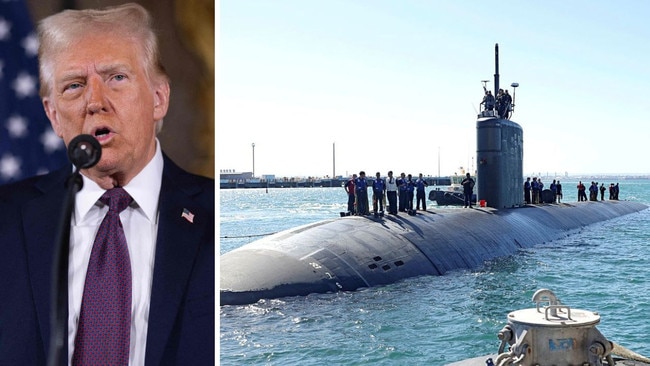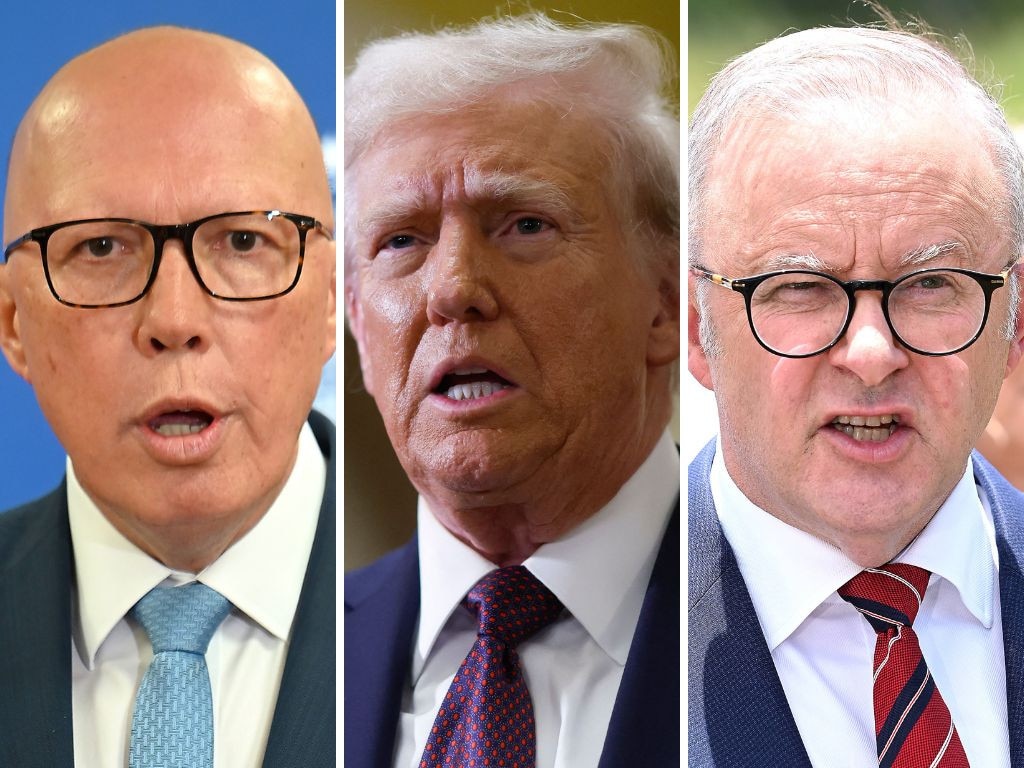Bipartisan support for AUKUS leading into new Donald Trump era
Leading Democrats and Republicans say the pact is a model for how the US should engage with allies, as Donald Trump entertains using force against friendly nations to expand America’s footprint.

Leading Democratic and Republican congressmen say the AUKUS security pact is a model for how the US should engage with allies and that its domestic political support is growing, as Donald Trump entertains using military and economic force against friendly nations to expand America’s global footprint.
The bipartisan endorsement of the landmark trilateral security agreement from the Democratic co-chair of the Congressional AUKUS Working Group, Joe Courtney, and the Republican chairman emeritus of the powerful House Foreign Affairs Committee, Michael McCaul, comes less than two weeks before the inauguration of Donald Trump ushers in a new-era for America in world affairs.
Mr Courtney and Mr McCaul framed the AUKUS agreement as an instrument to rally democracies in the Indo-Pacific while deterring Chinese aggression.
Anthony Albanese this week declared he was better placed than Peter Dutton to manage ties with the incoming administration. Mr Albanese played down differences between his government and Mr Trump on issues such as climate change, arguing instead that his close relationships in the region with Asian leaders would carry weight with the incoming president.
The US president-elect on Wednesday (AEDT) signalled he was serious about breaking his own path in foreign policy by doubling down on audacious plans to acquire Canada, Greenland and the Panama Canal.
He talked up ambitions to make Canada the 51st state – including through the use of economic force – and refused to rule out the use of the US military to seize control of the Panama Canal and Greenland, a Danish territory. In addition, Mr Trump flagged plans to change the name of the Gulf of Mexico to the Gulf of America.
These aspirations were swiftly rejected as unrealistic by Canada, Panama, Greenland and Denmark – a founding member of NATO along with the US – as well as the current Biden administration and other European leaders.
Speaking in Paris, Secretary of State Antony Blinken said US acquisition of Greenland was “not going to happen” while French Foreign Minister Jean-Noel Barrot said there would be “no invasion”. German Chancellor Olaf Scholz responded to Mr Trump’s comments by saying that “a certain lack of understanding has emerged with regard to recent statements from the US”.
“Borders must not be moved by force,” Mr Scholz said.
Amid lingering uncertainty over Mr Trump’s approach to the Indo-Pacific and handling of AUKUS, Mr Courtney said the $US895bn ($1.44 trillion) National Defence Authorisation Act, which passed congress in December, “strengthened the Pillar One submarine program” and revealed the “strong bipartisan support” for the trilateral security partnership between the US, Australia and the UK.
Under Pillar One, the US has agreed to sell Australia at least three Virginia class submarines to help Canberra develop its own fleet of nuclear-powered submarines; Pillar Two is aimed at enhancing advanced technology co-operation - including in cyber, undersea, quantum science and hypersonic capabilities.
Writing in The Australian, Mr Courtney, who was last year appointed into the Order of Australia, said “one of the clear indicators” of AUKUS’s success was the high interest of US allies – New Zealand, South Korea, and Japan – in becoming partners in the security agreement.
Mr McCaul said the AUKUS agreement “keeps Chairman Xi (Jinping) up at night” and was confident it would continue to enjoy bipartisan support “as we work to deter CCP aggression in the Indo-Pacific”.
Former prime minister Scott Morrison, who spent New Year’s Eve with Mr Trump at Mar-a-Lago, said in December that the Albanese government needed to champion AUKUS as an agreement aimed at deterring Chinese military aggression, to maximise its potential under a Trump administration. “In promoting AUKUS here in the US we need to appreciate that its primary reason for being is to provide a deterrent against adversarial threats,” Mr Morrison said. “The primary one of those is China. And to pretend it’s not does not aid the argument well here”.
Mr Albanese has overseen a normalisation of relations with Beijing since taking office and told The Australian this week he would not change his approach if Mr Trump launched a trade war, declaring that “we are a sovereign nation and we will act in terms of our economic interest”.
Mr Courtney said the recent National Defence Authorisation Act (NDAA) continued to build momentum for AUKUS in three important ways, including by “legalising Navy ship repairs to any yard overseas operated by a close ally”.
This would help “skill up and acquaint Australian naval personnel and shipyard workers with the repair and maintenance of Virginia-class submarines” while ensuring there was an “increased submarine presence in the Indo-Pacific” by reducing gaps caused by long transit times back and forth to US repair yards.
“Having US subs now permitted to undergo repair and maintenance overseas ... recognises Australia’s progress toward gaining proficiency,” he said.
Second, the NDAA provided the US Department of Defence with a mandate to analyse potential benefits of including Japan in the Pillar Two program. “Congress has heard loud and clear this interest from democratic allies in the Indo-Pacific, and the NDAA formally asked the Pentagon to seriously examine the benefits and challenges of Japan as a potential participant,” Mr Counrtney said.
Third, he said the NDAA was a case of the US congress acting forcefully to support submarine production essential to meeting the AUKUS schedule for the sale of Virginia-class submarines to Australia.
“In the national defence bill, we successfully reversed the Navy’s woefully inadequate request to cut procurement of a Virginia-class submarine and provided the Navy the authority to purchase a second Virginia-class submarine in 2025,” he said.
Mr McCaul said Mr Xi and the Chinese Communist Party were “not slowing down in their malign agenda — and the US and its allies must rise quickly to face that challenge”.
He said AUKUS was a “prime example of how we should be partnering with and trusting our allies”. “This crucial defence partnership keeps Chairman Xi up at night, and I am confident it will continue to enjoy bipartisan support as we work to deter CCP aggression in the Indo-Pacific,” Mr McCaul said.







To join the conversation, please log in. Don't have an account? Register
Join the conversation, you are commenting as Logout